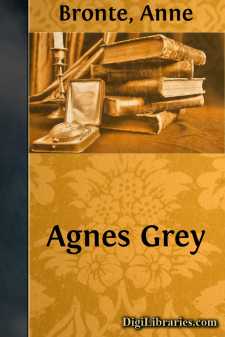Categories
- Antiques & Collectibles 13
- Architecture 36
- Art 48
- Bibles 22
- Biography & Autobiography 813
- Body, Mind & Spirit 142
- Business & Economics 28
- Children's Books 17
- Children's Fiction 14
- Computers 4
- Cooking 94
- Crafts & Hobbies 4
- Drama 346
- Education 46
- Family & Relationships 57
- Fiction 11829
- Games 19
- Gardening 17
- Health & Fitness 34
- History 1377
- House & Home 1
- Humor 147
- Juvenile Fiction 1873
- Juvenile Nonfiction 202
- Language Arts & Disciplines 88
- Law 16
- Literary Collections 686
- Literary Criticism 179
- Mathematics 13
- Medical 41
- Music 40
- Nature 179
- Non-Classifiable 1768
- Performing Arts 7
- Periodicals 1453
- Philosophy 64
- Photography 2
- Poetry 896
- Political Science 203
- Psychology 42
- Reference 154
- Religion 513
- Science 126
- Self-Help 84
- Social Science 81
- Sports & Recreation 34
- Study Aids 3
- Technology & Engineering 59
- Transportation 23
- Travel 463
- True Crime 29
Agnes Grey
by: Anne Bronte
Categories:
Description:
Excerpt
CHAPTER IâTHE PARSONAGE
All true histories contain instruction; though, in some, the treasure may be hard to find, and when found, so trivial in quantity, that the dry, shrivelled kernel scarcely compensates for the trouble of cracking the nut. Whether this be the case with my history or not, I am hardly competent to judge. I sometimes think it might prove useful to some, and entertaining to others; but the world may judge for itself. Shielded by my own obscurity, and by the lapse of years, and a few fictitious names, I do not fear to venture; and will candidly lay before the public what I would not disclose to the most intimate friend.
My father was a clergyman of the north of England, who was deservedly respected by all who knew him; and, in his younger days, lived pretty comfortably on the joint income of a small incumbency and a snug little property of his own. My mother, who married him against the wishes of her friends, was a squireâs daughter, and a woman of spirit. In vain it was represented to her, that if she became the poor parsonâs wife, she must relinquish her carriage and her ladyâs-maid, and all the luxuries and elegancies of affluence; which to her were little less than the necessaries of life. A carriage and a ladyâs-maid were great conveniences; but, thank heaven, she had feet to carry her, and hands to minister to her own necessities. An elegant house and spacious grounds were not to be despised; but she would rather live in a cottage with Richard Grey than in a palace with any other man in the world.
Finding arguments of no avail, her father, at length, told the lovers they might marry if they pleased; but, in so doing, his daughter would forfeit every fraction of her fortune. He expected this would cool the ardour of both; but he was mistaken. My father knew too well my motherâs superior worth not to be sensible that she was a valuable fortune in herself: and if she would but consent to embellish his humble hearth he should be happy to take her on any terms; while she, on her part, would rather labour with her own hands than be divided from the man she loved, whose happiness it would be her joy to make, and who was already one with her in heart and soul. So her fortune went to swell the purse of a wiser sister, who had married a rich nabob; and she, to the wonder and compassionate regret of all who knew her, went to bury herself in the homely village parsonage among the hills of ---. And yet, in spite of all this, and in spite of my motherâs high spirit and my fatherâs whims, I believe you might search all England through, and fail to find a happier couple.
Of six children, my sister Mary and myself were the only two that survived the perils of infancy and early childhood. I, being the younger by five or six years, was always regarded as the child, and the pet of the family: father, mother, and sister, all combined to spoil meânot by foolish indulgence, to render me fractious and ungovernable, but by ceaseless kindness, to make me too helpless and dependentâtoo unfit for buffeting with the cares and turmoils of life....




